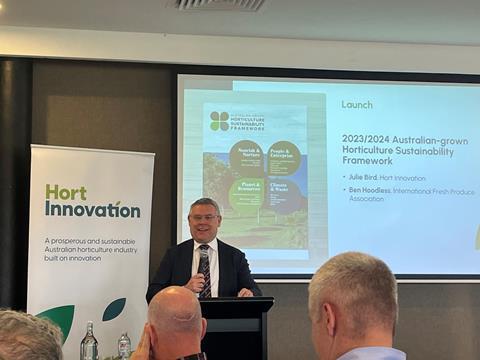The 2023/24 Australian-grown Horticulture Sustainability Framework provides a roadmap for the horticulture sector

Grower groups from across Australia and national representative bodies have joined in supporting the newly released 2023/24 Australian-grown Horticulture Sustainability Framework, a tool to help the horticulture sector share its sustainable, ethical, and safe farming practice stories with stakeholders.
Developed through Hort Innovation, this resource equips growers to proactively manage sustainability now, and in the future.
Federal minister for agriculture, fisheries and forestry Murray Watt launched the Framework on 23 November and said it provides a sustainability roadmap for the horticulture sector.
“Being able to demonstrate sustainability is becoming increasingly important to domestic consumers and our international trading partners,” he said.
“A strong, sustainable horticulture sector produces nourishing food, fulfilling employment, and helps protect our environment now and for future generations.
“This Sustainability Framework initiative unites the horticulture sector in its journey to monitor the sustainability issues that matter to its stakeholders.”
Hort Innovation chair Julie Bird said the Framework was the culmination of an extensive consultation process to understand the horticulture sectors’ sustainability priorities for the future.
“Hort Innovation has worked with more than 600 stakeholders to deliver the Framework, which promotes sustainable and responsible care for our natural environment and provides a vital roadmap for a stronger Australian farming future,” Bird said.
National Farmers Federation horticulture council executive officer Richard Shannon said the horticulture sector is now looking at how it can harness the Framework and start telling its story.
“The council, on behalf of its members, supports the 2023/24 Australian-grown Horticulture Sustainability Framework as an important tool for growers to translate their practices, which in many cases are already leading edge, into a language their buyers, consumers and the public understand,” Shannon said.
“While horticulture, like any industry, has room to improve, we also have a strong and proud history of proactively providing assurance for consumers and the public where concerns arise, including around food safety and more recently fair employment practices. The Framework captures this existing work and gives us a guide for our future efforts”.
The Sustainability Framework has identified four areas significant to the sustainable production of fruits, vegetables, nuts and amenity horticulture in Australia:
Nourish & Nurture recognises the role of Australian horticultural produce in improving diets, health and wellbeing by providing safe, quality food and greenlife.
People & Enterprise identifies the strong links between the people, enterprises, communities and economic value of Australian-grown horticulture.
Planet & Resources focusses on sustainable agricultural practices by reducing any impacts on the natural environment and on the dependence of horticultural production on resources, biosecurity.
Climate and waste is about reducing all forms of waste in horticultural production and resilience to climatic variability.
Hort Innovation currently invests $80 million in a range of sustainability-focussed initiatives to support the horticulture sector in achieving its sustainability goals. Most of these projects contain Commonwealth contributions and focus on everything from reducing carbon emissions and water use efficiency, to reducing waste, and breeding smaller trees that require less inputs to smart technology.



